Показать сокращенную информацию
The attitude of Jesus towards women in the Lukan narrative: A paragon for Christian leaders
| dc.contributor.adviser | Pagara, Bernabe C. | |
| dc.contributor.author | Trang, U Minh | |
| dc.date.accessioned | 2021-07-26T05:31:34Z | |
| dc.date.available | 2021-07-26T05:31:34Z | |
| dc.date.issued | 2017 | |
| dc.identifier.citation | Trang, U. M. (2017). The attitude of Jesus towards women in the Lukan narrative: A paragon for Christian leaders (Unpublished Master's special paper). Central Philippine University, Jaro, Iloilo City. | en_US |
| dc.identifier.uri | https://hdl.handle.net/20.500.12852/1235 | |
| dc.description | Abstract only | en_US |
| dc.description.abstract | This study attempted to determine the attitude of Jesus towards women in the Lukan narrative as a paragon for Christian leaders. It also sought to describe the following, namely: socio-cultural milieu of the First Century world on values, gender issues, and social system; status of women according to different groups and periods as to women’s roles and their stories; attitude of Jesus toward women; implications of Jesus’ attitude toward women to Christian leaders. In Judaism, the attitude toward women was shaped by the Israelites tradition. In the Roman Empire, women were educated; some were influential and exercised freedom in public life. In ancient Rome, they were valued mainly as wives and mothers. Within the Hellenistic society, women were extremely inferior to the role that men played and were subservient to men. In the Early Church, women were active and are named as having key roles within the work of the church, but few are given titles. In sum, women belonged in the private domestic sphere while men took their place in the public arena. The stories about women are critical as they present a narrative that reveals a God who becomes present with the outsider and creates a community with all who come to faith in Jesus. Jesus’ approach to women was “revolutionary” for his era. Above all, by his attitude, Jesus saved women from being thought of as merely sexual beings, honouring them as human beings, persons, children of God afforded with gifts to be used freely without any reservation and suppression because of gender. | en_US |
| dc.format.extent | 126 leaves | en_US |
| dc.language.iso | en | en_US |
| dc.rights | Attribution-NonCommercial-NoDerivs 3.0 Philippines | * |
| dc.rights.uri | http://creativecommons.org/licenses/by-nc-nd/3.0/ph/ | * |
| dc.subject.ddc | TheoLib Thesis 200.72 T686 | en_US |
| dc.subject.lcsh | Bible. Luke | en_US |
| dc.subject.lcsh | Bible | en_US |
| dc.subject.lcsh | Women | en_US |
| dc.subject.lcsh | Women in the Bible | en_US |
| dc.subject.lcsh | Jesus Christ | en_US |
| dc.subject.lcsh | Christian leadership | en_US |
| dc.subject.lcsh | Bible. Luke--Commentaries | en |
| dc.title | The attitude of Jesus towards women in the Lukan narrative: A paragon for Christian leaders | en_US |
| dc.type | Special paper | en_US |
| dc.description.bibliographicalreferences | Includes bibliographical references | en_US |
| dc.contributor.committeemember | Villeza, Rea Angelica F. | |
| dc.contributor.committeemember | Narciso, Jerson B. | |
| dc.contributor.department | School of Graduate Studies | en_US |
| dc.description.degree | Master of Divinity | en_US |
Файлы в этом документе
Данный элемент включен в следующие коллекции
-
Master of Divinity [36]



